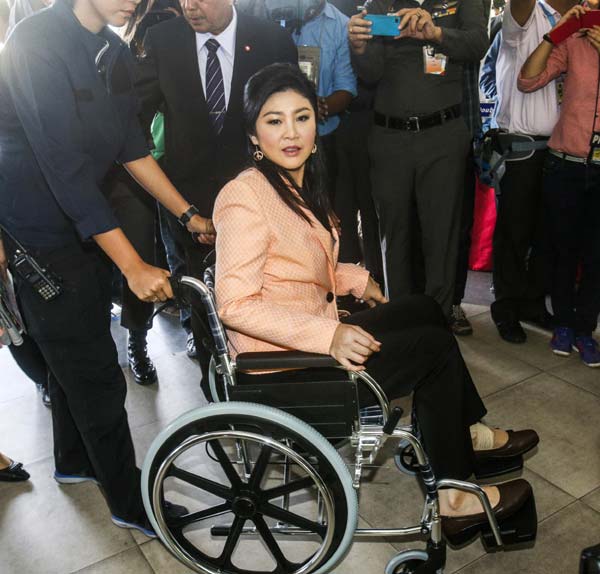 |
|
Thai Prime Minister Yingluck Shinawatra arrives in a wheelchair at the Royal Police Cadet Academy in Nakhon Pathom province on Tuesday. Thailand's government is lifting a state of emergency in Bangkok and surrounding provinces. Athit Perawongmetha / Reuters |
Thailand is lifting a state of emergency in Bangkok, taking a step to restore some confidence as anti-government protests subside, though the crisis has entered a new phase with Prime Minister Yingluck Shinawatra besieged by legal challenges.
The protesters, mainly from Bangkok and the south, have been trying since November to oust Yingluck and rid the country of the influence of her brother, self-exiled former premier Thaksin Shinawatra who was toppled by the army in 2006.
The government imposed a state of emergency two months ago, but largely resisted taking heavy-handed action, though 23 people have been killed during the unrest, most in shootings and grenade blasts.
The protests have waned in recent weeks and are now mostly confined to Lumpini Park in Bangkok's central business district and a few other sites.
But the threat of further violence remains real, especially after changes at the top of the pro-Thaksin "red shirt" movement over the weekend, with a new, more militant leader promising "to fight tooth and nail" to defend Yingluck.
The state of emergency will be replaced by another special law from Wednesday after a decision taken at a cabinet meeting held on Tuesday in Nakhon Pathom province, about 80 km from Bangkok.
Yingluck arrived for the meeting in a wheelchair after slipping as she stepped out of a car on Saturday in the northern city of Chiang Mai, her stronghold.
"We're confident that we can handle the situation so the cabinet agreed to revoke the state of emergency as requested by many parties," Yingluck told reporters.
"The cancellation is to build confidence in the economy and the tourism sector," she said.
In its place, the government will use the Internal Security Act, a less harsh law that still allows the authorities to impose curfews, operate security checkpoints and restrict the movement of protesters as needed.
"Lifting the emergency law should have a positive impact on businesses. Many really felt the pinch and lost customers because the state of emergency was in place, including tour operators who saw huge cancellations," said political analyst Kan Yuenyong at Siam Intelligence Unit.
"It should also improve the state's image because rights groups tend to view the emergency law as draconian. But, ultimately, no law can help the government contain the protests if they flare up again."
Legal challenges
The government set the 60-day emergency from Jan 22 to help contain protests in the run-up to a general election on Feb 2, but most of its measures were barely used, especially after a court ruled on Feb 19 that some had been imposed illegally.
The election in February was disrupted by protesters in almost 70 of the 375 constituencies, leaving the House of Representatives without a quorum to elect a new prime minister.
The Constitutional Court has accepted a petition to consider annulling the election, which could further delay the formation of a government.
Yingluck, whose Puea Thai Party had been expected to win the vote, heads a caretaker administration with limited powers. She faces a slew of court cases that could bring her down, including a charge of dereliction of duty over a rice subsidy scheme that owes money to hundreds of thousands of farmers.
Tourism has suffered during the unrest. Arrivals were down 4.1 percent in January and February compared to the same high-season period last year, according to the tourism ministry.
Reuters-AFP